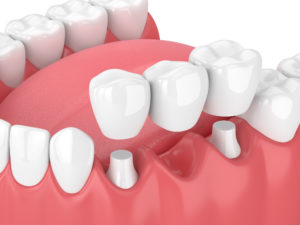
Your teeth are among your most valuable possessions. That’s why your dentist goes to such great lengths to keep them in good shape. One of the best ways to prevent damage to a tooth is to protect it with a crown. Crowns are strong, comfortable and practical.
When Good Teeth Go Bad
Tooth decay is a progressive disease that starts at the top of a tooth and works its way down to the root. This means that very often your dentist can save the bottom portion of the tooth with proper intervention.
This is where crowns come into the picture. A crown rests on top of a damaged tooth and protects it from further harm. It also restores lost functionality, enabling the patient to eat, speak and perform other daily tasks.
Crowns are sometimes used for cosmetic enhancement. For example, a crown can hide a tooth that’s misshapen or discolored. Crowns can also be used to complete a dental implant or as a foundation for a bridge.
How Your Dentist Will Install Your Crown
The first step is to administer pain blockers to ensure your comfort throughout the procedure. The dentist may also use light to medium sedation if you wish. He or she will then file and shape the tooth to receive the crown.
The last step is to attach the crown using a special form of dental adhesive. In most cases you’ll receive a temporary crown while the permanent one is crafted to fit your mouth in a dental laboratory. In some cases a local dentist can create permanent crowns on site.
What Are Crowns Made of?
Crowns can be made from a variety of materials, each of which offers its own mix of advantages and considerations. Choices include:
- Metals such as stainless steel or gold alloys. Crowns made from these materials are exceptionally strong and can last for many, many years. However, some patients object to their metallic sheen.
- Ceramic or porcelain. Crowns made from these materials more closely resemble natural teeth. However, they’re not quite as durable as ones made from metal.
- Porcelain fused to metal. This option combines the aesthetic appeal of porcelain with the durability of metal. However, over time the porcelain coating can wear off, exposing the metal underneath.
- The chief advantage of this material is its affordability. Crowns made from resin are more vulnerable to wear and stress than other types.
How Do I Take Care of a Dental Crown?
Once your crown is in place caring for it is relatively straightforward. Simply follow the same steps you use to protect your natural teeth. This includes regular brushing and flossing, avoiding sweets, eating a healthy diet and seeing your dentist on a regular basis for cleanings and checkups.
Crowns occasionally fail over time. Sometimes this is due to tooth and gum disease, other times to ordinary wear and tear. Your dentist can give you more information on this important topic. In many cases, a dental crown is an effective treatment for a number of oral health issues.
About the Author
Doctor Leslie Metzger earned her dental degree from Ohio State University College of Dentistry. She’s a proud member of the American Dental Association and the Michigan Dental Association. You can reach her office online or by calling (248) 476-3410.
